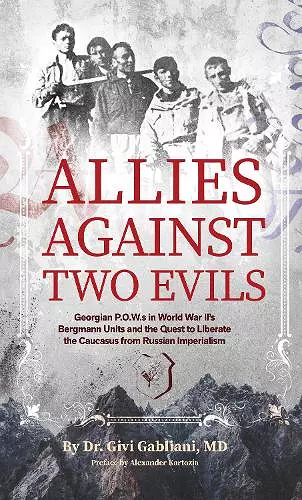Allies Against Two Evils
World War II, The Bergmann Unit's Georgian POWs and the Quest to Liberate the Caucasus from Russian Imperialism
Givi Gabliani author Hans von Herwarth author Alexander Kartozia editor
Format:Paperback
Publisher:DoppelHouse Press
Published:28th Sep '23
Should be back in stock very soon
This paperback is available in another edition too:
- Hardback£35.99(9781954600249)

An eye-witness account of the Russian/European conflict at the heart of WWII, relevant today as war rages again along similar battle lines in Ukraine, Crimea and the Caucasus.
In a corner of 20th-century history almost unknown to the English-speaking public, anti-Stalinist Georgians and anti-Hitlerite Germans worked as an arm of the German Resistance, disavowing Hitler’s inhuman "East Policy" mandates and seeking to liberate Caucasian nations from Stalin. Allies Against Two Evils: Georgian P.O.W.s in WWII’s Bergmann Units and the Quest to Liberate the Caucasus from Russian Imperialism by exiled Georgian M.D. Givi Gabliani vividly recalls this time, the hopes of the Georgians who fought in World War II, their solidarity, their tribulations, their devotion to the Jewish people, and why they made the alliances they did.
Gabliani's memoir, written in English and published several years ago in Georgia, contrasts the vision of an ascendant Russian Empire and a decaying West with historical European-Georgian cooperation and the centuries-long quest of the Georgian people for self-determination.
The preface by Georgian-German scholar and former head of the Georgian National Library, Alexander Kartozia examines the legacy of Givi Gabliani and the Gabliani family from the highland province of Svaneti, keepers of 12th century artifacts from Georgia's Golden Age and leaders of the 1920s resistance insurgency against Soviet invasion.
Gabliani envisions a future Europe supporting a trans-Caucasian alliance with mixed races and religions living together equally in tolerance and prosperous harmony, as they had for millennia in Georgia. As a spokesman for the POWs, he coordinates with the Georgian exile government in occupied Paris and Berlin, finding a secret effort afoot in occupied France to save Georgian and other Eastern European Jews. Today, Gabliani's war memoir centers our attention on an active fault line. Across the great conflicts of the twentieth century that undergird and still define the region between Russia, with its imperialist ambitions, and the Black Sea, Georgia and the Georgian people appear as some of the most likely partners for international efforts toward peace.
“In 1921, the Soviets occupied Georgia by force. Givi Gabliani naturally opposed Soviet imperialistic and criminal rule. The German Resistance wanted — after the overthrow of Hitler — to liberate the different nations in the Soviet Union from Soviet dictatorship. Therefore, Givi Gabliani as a prisoner of war in 1941 decided to cooperate with the German Resistance. In 1942, he joined a Caucasian volunteer unit which was formed by Admiral Canaris, a leading member of the German Resistance executed in 1945. In 1943, Gabliani became a member of the Georgian liaison mission, which represented also the Georgian exile government in Paris. The Georgian liaison mission worked closely together with the German Resistance, especially with Colonel Count Stauffenberg and Ambassador von der Schulenburg, who both were the fathers of the Soviet volunteer [forces] in the German Army. The Bergmann military unit was created in 1941, composed of Georgian emigrants to the West as well as those who had stayed in their home country [and were conscripted to fight with the Red Army]. Givi Gabliani, in the frame of the Bergmann unit, and later as a member of the Georgian-National Committee had an important role in this period. His memoirs offer a rich source pertaining to German-Georgian history.”
— Hans von Herwarth, Former German Ambassador to Britain, January 18, 1988.
ISBN: 9781954600911
Dimensions: 228mm x 152mm x 25mm
Weight: unknown
400 pages